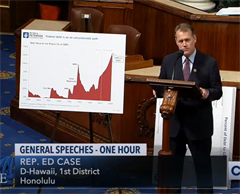Our national debt (the total amount owed by our federal government to our creditors) has now past $36 trillion, an unprecedented amount both overall and by various other measures such as in relation to our overall economy (debt-to-GDP). As just one consequence of great concern, the annual interest payments on our debt are now the fastest-growing part of our federal budget.
 This year, we’ll spend more money on interest payments on the debt than all federal funding on our American children, and on our current path by 2030 our interest payments will exceed our defense budget. This not only presents a great risk to economic, social and defense stability, but also is a stark indicator of fiscal unsustainability.
This year, we’ll spend more money on interest payments on the debt than all federal funding on our American children, and on our current path by 2030 our interest payments will exceed our defense budget. This not only presents a great risk to economic, social and defense stability, but also is a stark indicator of fiscal unsustainability.
I believe that our federal budget should not be, as it has become, a routine exercise, but instead a document and agenda that comprehensively address our nation’s needs and expenses in a fiscally sustainable way. We have urgent challenges, from climate change to health care and beyond, and we need a full and difficult debate on how best to balance their cost with our ability and commitment to raise and allocate scarce resources.
As part of my own efforts to address this crisis, in early 2023 I worked within my bipartisan Problem Solvers Caucus to create a bipartisan deal to both prevent a default on the debt limit and return our federal finances to a sustainable path. The debt limit deal that was signed into law for all parties included elements of our Problem Solvers’ plan, such as stabilization measures to address spending, but they do not address the underlying structural causes of the debt and deficit. We must take a broad look at the sustainability of our nation’s current debt and budget deficit and stay focused on addressing the underlying issues.
I have also introduced the Sustainable Budget Act, which establishes an 18-person bipartisan commission to propose policies to improve our fiscal outlook, balance the budget and achieve fiscal sustainability. The bill requires Congress to take an up or down vote on the commission’s recommendations within a year after they are issued. You can read the bill here and review my statement to the full House about this bill here.
There are a number of priorities that we must address, but without a conversation on the debt, payments on the interest will crowd out our ability to address these and currently-unknown priorities. For an overview as well as specific initiatives, I invite you to watch my speech before the full House on our fiscal crisis here, and please also view my testimony to the U.S. House Budget Committee on a path forward to address the debt and deficit here.

 This year, we’ll spend more money on interest payments on the debt than all federal funding on our American children, and on our current path by 2030 our interest payments will exceed our defense budget. This not only presents a great risk to economic, social and defense stability, but also is a stark indicator of fiscal unsustainability.
This year, we’ll spend more money on interest payments on the debt than all federal funding on our American children, and on our current path by 2030 our interest payments will exceed our defense budget. This not only presents a great risk to economic, social and defense stability, but also is a stark indicator of fiscal unsustainability. 